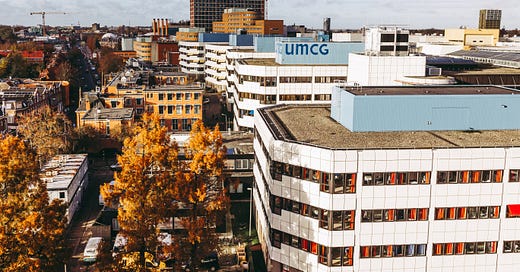Hospital Care Accessibility in Northern Netherlands Under Severe Pressure
Staff shortages, outdated facilities, and long travel times are impacting emergency care in the region.
The Northern Netherlands faces significant challenges in maintaining accessible hospital care, particularly in emergency departments. According to a recent report by consultancy firm Gupta Strategists, the region is facing more challenges compared to other parts of the country. Shortages in healthcare staff, the declining financial health of hospitals, and longer travel times to emergency services are significant issues.
Staff Shortages and Pressure on Critical Care
Hospitals across the Northern Netherlands, including key facilities like UMCG (University Medical Center Groningen) and Martini Hospital, are facing an ongoing shortage of specialised healthcare personnel. This includes critical professions such as ICU nurses, surgical assistants, and anaesthesia staff. While the shortage of healthcare workers is a nationwide issue, the North scores poorly, similar to most regions in the country. Hospitals are grappling with these shortages, leading to longer waiting times and increased strain on the remaining staff.
Hospitals with operational emergency departments are now more "sensitive" to this 45-minute standard. If additional ERs close, even more residents would be outside the acceptable range for emergency care. UMCG, a major hospital in the region, has been labelled as particularly vulnerable, as the closure of nearby emergency services adds to the pressure on its emergency department.
Outdated Infrastructure and Financial Strain
Another significant challenge highlighted in the report is the poor financial health of hospitals in the region. Many hospital buildings in the North are outdated and in dire need of renovation. For instance, more than 50% of the buildings at UMCG and Martini Hospital have been written off, meaning they have outlived their expected lifespan. While UMCG has been undergoing substantial renovations, these projects consume a large portion of the hospital’s income—up to 25%—leaving little room for further innovation or upgrades.
The financial strain on hospitals in the North makes it difficult to invest in necessary improvements, putting the future quality and accessibility of care at risk. The report notes that regional hospitals, in particular, are financially unstable, which hinders their ability to maintain or expand services.
A Widespread Issue
The Northern Netherlands is not alone in facing these issues. The region shares similar challenges with Zwolle, as both areas deal with limited creditworthiness of hospitals, shrinking acute care options, and shortages in critical healthcare personnel. Across the country, 30 hospitals are now categorized as “sensitive” to meeting the 45-minute emergency care standard, with rural regions like the North particularly affected.
The Gupta report calls for more integrated solutions, including better collaboration among healthcare professionals to alleviate pressure on emergency departments. Without substantial investments in hospital infrastructure, staffing, and innovation, the current system is described as unsustainable.





